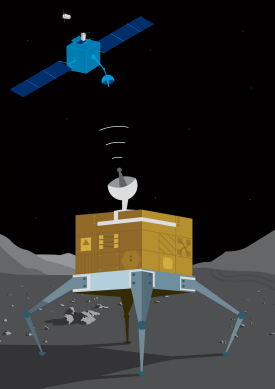Back to the Moon the sustainable way
9 May 2018
 |
| In-Situ Resource Utilisation. Credit: ESA–K. Oldenburg |
To live and work on the Moon, humans need oxygen, water and other consumables for life support, propellant production and building habitats. Making use of local resources may be the key to a truly sustainable stay on the lunar surface.
ESA is looking for the technology that can turn indigenous material into oxygen and water as these are critical resources for sustaining long-term human operations in deep space. Engineers and scientists are also investigating ways to produce construction materials on the Moon.
The extraction and processing of local resources into useful products and services on another celestial body is often referred to as In-Situ Resource Utilisation or ISRU.
ESA is currently preparing a lunar surface mission to demonstrate technologies needed for in-situ resource utilisation on the Moon. One goal is to show by 2025, that it is possible to produce water or oxygen on the Moon. The mission may also create the opportunity to deliver scientific payloads directly to the lunar surface.
ESA aims to foster new models of doing space business. Rather than developing a complete lunar mission from scratch, this new approach contemplates the possibility of buying a ride on a lander developed by the private sector to deliver European payloads safely to the lunar surface.
Working together with commercial partners may open the door for new ESA mission concepts.
Request for information
ESA wants a return to the Moon based on partnerships that involve international space agencies and businesses. Joining forces makes lunar exploration viable, competitive and sustainable.
If you are ready to take on the challenge, we want to hear from you.
This Request for Information [PDF, 256 KB] supports ESA in identifying potential suppliers, service providers and partners, as well as technical solutions for:
- Technology demonstrations for in-situ resource utilisation;
- Lunar science payloads;
- Commercial services for payload delivery (including lander), lunar communications and operations.
The Request For Information is open to European and non-European entities.
Responses should be sent by email to lunarRFI@esa.int by 8 June 2018.
An ESA workshop on lunar resources is taking place on 3–5 July at ESA ESTEC in Noordwijk, the Netherlands.
